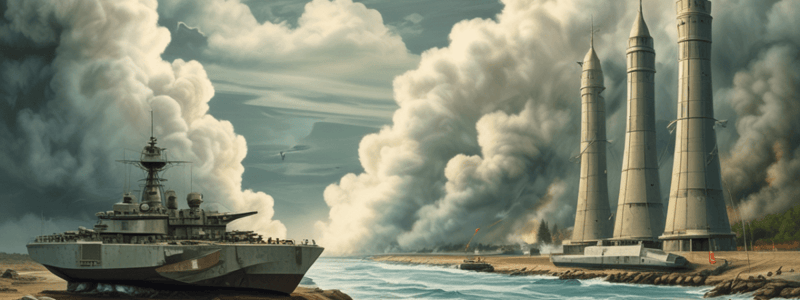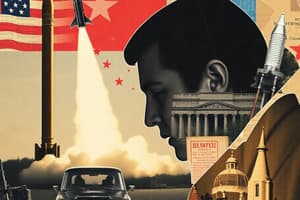Podcast
Questions and Answers
What was one of the outcomes of the Cuban Missile Crisis?
What was one of the outcomes of the Cuban Missile Crisis?
- Military conflict between the United States and the Soviet Union
- Dismantling of NATO
- Installation of a hotline between Moscow and Washington, D.C. (correct)
- A complete ban on all nuclear test explosions
Who acknowledged that actions during the Cuban Missile Crisis were influenced by misjudgment and miscalculations?
Who acknowledged that actions during the Cuban Missile Crisis were influenced by misjudgment and miscalculations?
- Premier Khrushchev
- President Kennedy
- General LeMay
- Secretary McNamara (correct)
What was NOT a characteristic of the Cold War?
What was NOT a characteristic of the Cold War?
- Bay of Pigs invasion
- Cuban Missile Crisis
- Normandy Invasion (correct)
- Berlin Crisis
Which event involved the shoot-down of an American U-2 spy plane over the Soviet Union?
Which event involved the shoot-down of an American U-2 spy plane over the Soviet Union?
What was one of the main dangers highlighted during the Cold War?
What was one of the main dangers highlighted during the Cold War?
Who was the Soviet Premier during the Cuban Missile Crisis?
Who was the Soviet Premier during the Cuban Missile Crisis?
What was the event that demonstrated the U.S.'s willingness to use military force against Cuba before the Cuban Missile Crisis?
What was the event that demonstrated the U.S.'s willingness to use military force against Cuba before the Cuban Missile Crisis?
Who was the U.S. President who resolved the Cuban Missile Crisis peacefully?
Who was the U.S. President who resolved the Cuban Missile Crisis peacefully?
What was the relationship between the United States and the Soviet Union before the Cuban Missile Crisis?
What was the relationship between the United States and the Soviet Union before the Cuban Missile Crisis?
What role did Fidel Castro play in the Cuban Missile Crisis?
What role did Fidel Castro play in the Cuban Missile Crisis?
Flashcards are hidden until you start studying
Study Notes
Cuban Missile Crisis
The Cuban Missile Crisis was a pivotal event during the Cold War that took place in October 1962. This 13-day standoff between the United States and the Soviet Union brought the world to the brink of nuclear war. The crisis was triggered by the deployment of Soviet missiles in Cuba, just 90 miles from the United States, and was a tense moment in the history of the United States and the Soviet Union.
Key Figures in Cuban Missile Crisis
The Cuban Missile Crisis involved several key figures who played crucial roles in shaping the outcome of the crisis:
- Nikita Khrushchev: Soviet Premier at the time, Khrushchev ordered the deployment of Soviet missiles in Cuba.
- John F. Kennedy: U.S. President, Kennedy demanded the removal of the missiles from Cuba and ultimately resolved the crisis peacefully.
- Fidel Castro: Cuban Premier, Castro allowed the Soviet Union to deploy missiles in Cuba.
- Robert McNamara: U.S. Secretary of Defense, McNamara oversaw military operations during the crisis.
Bay of Pigs Invasion
The failed Bay of Pigs invasion was an American attempt to overthrow the Cuban government, which took place in April 1961. The invasion was a significant event leading up to the Cuban Missile Crisis, as it demonstrated the U.S.'s willingness to use military force against Cuba.
U.S.-Soviet Relations
The Cuban Missile Crisis was a significant turning point in U.S.-Soviet relations. It led to the installation of a "hotline" of teletype machines between Moscow and Washington, D.C., and both sides pursued a partial ban on some types of nuclear test explosions that took effect in 1963. However, the danger of a nuclear war through accident or miscommunication remained high, with Secretary McNamara acknowledging that the actions of all parties were shaped by misjudgment, miscalculations, and misinformation.
Cold War Events
The Cuban Missile Crisis was a direct and dangerous confrontation during the Cold War, a period of political and military tension between the United States and the Soviet Union. The crisis was one of several events that characterized the Cold War, including the Berlin Crisis and the shoot-down of an American U-2 spy plane over the Soviet Union.
In conclusion, the Cuban Missile Crisis was a critical moment in history that demonstrated the risks and consequences of nuclear weapons and cold war politics. Although the crisis was resolved peacefully, it served as a reminder of the importance of diplomacy and the potential dangers of military conflict.
Studying That Suits You
Use AI to generate personalized quizzes and flashcards to suit your learning preferences.




